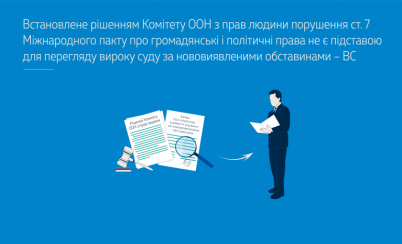Contact center of the Ukrainian Judiciary 044 207-35-46

Violation of Article 7 of the International Covenant on Civil and Political Rights, as established by the decision of the UN Human Rights Committee, does not constitute a ground for review of a court decision on the basis of newly discovered circumstances, since it does not refer, in the sense of para. 4, part 2, Article 459 of the Criminal Procedural Code of Ukraine, to other circumstances, which were not known to the court at the time of making the court decision, and which, by themselves or together with the previously discovered circumstances, prove the inaccuracy of the verdict or decision under review.
This is stated in the resolution of the Criminal Cassation Court of the Supreme Court.
According to the materials of the case, the person appealed to the court of first instance with a request for review of the verdict of the court of appeal on the basis of newly discovered circumstances, by which he was sentenced to life imprisonment under part 1 of Article 115, para. 13 of part 2 of Article 115, part 3 of Article 358, Article 70 of the Criminal Code of Ukraine.
In his application, the convicted person stated that the violation of Article 7 of the International Covenant on Civil and Political Rights, as established by the decision of the UN Human Rights Committee of July 26, 2022, namely the imposition of life imprisonment, which is "irreducible", was the reason for the review of the sentence on the basis of newly discovered circumstances. In the convicted person's opinion, the sentence is subject to review on the basis of para. 4, part 2, Art. 459 of the Criminal Procedural Code of Ukraine with the imposition of a sentence in the form of the maximum term under Art. 63 of the Criminal Code of Ukraine at the time of sentencing, which is subject to review (15 years) with release from custody due to full and effective serving of the sentence.
The court of first instance, in compliance with the requirements of Art. 459 of the Criminal Procedural Code of Ukraine, verified the circumstances referred to by the convict in his application. Having duly stated the reasons for its decision, the court correctly concluded that the circumstances mentioned in the application did not constitute other circumstances within the meaning of para. 4, part 2, Article 459 of the Criminal Procedural Code of Ukraine, since the established violation of Article 7 of the Covenant is not considered a ground for review of the court's decision on the basis of newly discovered circumstances, as it is not a newly discovered circumstance.
At the same time, in order to restore the violated right, the convicted person may apply for commutation of the unserved part of the sentence to a more lenient one in accordance with part 5 of Article 82 of the Criminal Code of Ukraine. After that, he will be able to apply for parole under para. 3, part 3, Article 81 of the Criminal Code of Ukraine.
The court also noted that the absence of an automatic compensation mechanism in the national legislation of Ukraine is not a reason to review the verdict on the basis of newly discovered circumstances. If a convicted person's rights have been violated, he or she has the option of filing an application with the European Court of Human Rights after filing a complaint with the national courts.
The Resolution of the Criminal Cassation Court of the Supreme Court of March 12, 2024 in case No. 1-9/2005 (proceedings No. 51-7853km18) - https://reyestr.court.gov.ua/Review/117657266.
This and other legal positions of the Supreme Court can be found in the Database of Legal Positions of the Supreme Court - https://lpd.court.gov.ua.